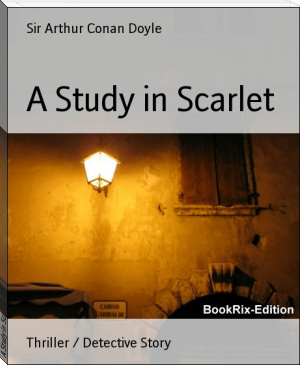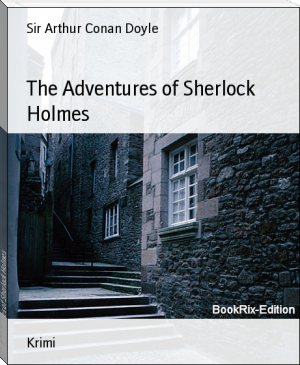A Study in Scarlet by Sir Arthur Conan Doyle (popular books of all time TXT) 📖

- Author: Sir Arthur Conan Doyle
Book online «A Study in Scarlet by Sir Arthur Conan Doyle (popular books of all time TXT) 📖». Author Sir Arthur Conan Doyle
SHERLOCK HOLMES--his limits.
1. Knowledge of Literature.--Nil.
2. Philosophy.--Nil.
3. Astronomy.--Nil.
4. Politics.--Feeble.
5. Botany.--Variable. Well up in belladonna,
opium, and poisons generally.
Knows nothing of practical gardening.
6. Geology.--Practical, but limited.
Tells at a glance different soils
from each other. After walks has
shown me splashes upon his trousers,
and told me by their colour and
consistence in what part of London
he had received them.
7. Chemistry.--Profound.
8. Anatomy.--Accurate, but unsystematic.
9. Sensational Literature.--Immense. He appears
to know every detail of every horror
perpetrated in the century.
10. Plays the violin well.
11. Is an expert singlestick player, boxer, and swordsman.
12. Has a good practical knowledge of British law.
When I had got so far in my list I threw it into the fire in despair. "If I can only find what the fellow is driving at by reconciling all these accomplishments, and discovering a calling which needs them all," I said to myself, "I may as well give up the attempt at once."
I see that I have alluded above to his powers upon the violin. These were very remarkable, but as eccentric as all his other accomplishments. That he could play pieces, and difficult pieces, I knew well, because at my request he has played me some of Mendelssohn's Lieder, and other favourites. When left to himself, however, he would seldom produce any music or attempt any recognized air. Leaning back in his arm-chair of an evening, he would close his eyes and scrape carelessly at the fiddle which was thrown across his knee. Sometimes the chords were sonorous and melancholy. Occasionally they were fantastic and cheerful. Clearly they reflected the thoughts which possessed him, but whether the music aided those thoughts, or whether the playing was simply the result of a whim or fancy was more than I could determine. I might have rebelled against these exasperating solos had it not been that he usually terminated them by playing in quick succession a whole series of my favourite airs as a slight compensation for the trial upon my patience.
During the first week or so we had no callers, and I had begun to think that my companion was as friendless a man as I was myself. Presently, however, I found that he had many acquaintances, and those in the most different classes of society. There was one little sallow rat-faced, dark-eyed fellow who was introduced to me as Mr. Lestrade, and who came three or four times in a single week. One morning a young girl called, fashionably dressed, and stayed for half an hour or more. The same afternoon brought a grey-headed, seedy visitor, looking like a Jew pedlar, who appeared to me to be much excited, and who was closely followed by a slip-shod elderly woman. On another occasion an old white-haired gentleman had an interview with my companion; and on another a railway porter in his velveteen uniform. When any of these nondescript individuals put in an appearance, Sherlock Holmes used to beg for the use of the sitting-room, and I would retire to my bed-room. He always apologized to me for putting me to this inconvenience. "I have to use this room as a place of business," he said, "and these people are my clients." Again I had an opportunity of asking him a point blank question, and again my delicacy prevented me from forcing another man to confide in me. I imagined at the time that he had some strong reason for not alluding to it, but he soon dispelled the idea by coming round to the subject of his own accord.
It was upon the 4th of March, as I have good reason to remember, that I rose somewhat earlier than usual, and found that Sherlock Holmes had not yet finished his breakfast. The landlady had become so accustomed to my late habits that my place had not been laid nor my coffee prepared. With the unreasonable petulance of mankind I rang the bell and gave a curt intimation that I was ready. Then I picked up a magazine from the table and attempted to while away the time with it, while my companion munched silently at his toast. One of the articles had a pencil mark at the heading, and I naturally began to run my eye through it.
Its somewhat ambitious title was "The Book of Life," and it attempted to show how much an observant man might learn by an accurate and systematic examination of all that came in his way. It struck me as being a remarkable mixture of shrewdness and of absurdity. The reasoning was close and intense, but the deductions appeared to me to be far-fetched and exaggerated. The writer claimed by a momentary expression, a twitch of a muscle or a glance of an eye, to fathom a man's inmost thoughts. Deceit, according to him, was an impossibility in the case of one trained to observation and analysis. His conclusions were as infallible as so many propositions of Euclid. So startling would his results appear to the uninitiated that until they learned the processes by which he had arrived at them they might well consider him as a necromancer.
"From a drop of water," said the writer, "a logician could infer the possibility of an Atlantic or a Niagara without having seen or heard of one or the other. So all life is a great chain, the nature of which is known whenever we are shown a single link of it. Like all other arts, the Science of Deduction and Analysis is one which can only be acquired by long and patient study nor is life long enough to allow any mortal to attain the highest possible perfection in it. Before turning to those moral and mental aspects of the matter which present the greatest difficulties, let the enquirer begin by mastering more elementary problems. Let him, on meeting a fellow-mortal, learn at a glance to distinguish the history of the man, and the trade or profession to which he belongs. Puerile as such an exercise may seem, it sharpens the faculties of observation, and teaches one where to look and what to look for. By a man's finger nails, by his coat-sleeve, by his boot, by his trouser knees, by the callosities of his forefinger and thumb, by his expression, by his shirt cuffs--by each of these things a man's calling is plainly revealed. That all united should fail to enlighten the competent enquirer in any case is almost inconceivable."
"What ineffable twaddle!" I cried, slapping the magazine down on the table, "I never read such rubbish in my life."
"What is it?" asked Sherlock Holmes.
"Why, this article," I said, pointing at it with my egg spoon as I sat down to my breakfast. "I see that you have read it since you have marked it. I don't deny that it is smartly written. It irritates me though. It is evidently the theory of some arm-chair lounger who evolves all these neat little paradoxes in the seclusion of his own study. It is not practical. I should like to see him clapped down in a third class carriage on the Underground, and asked to give the trades of all his fellow-travellers. I would lay a thousand to one against him."
"You would lose your money," Sherlock Holmes remarked calmly. "As for the article I wrote it myself."
"You!"
"Yes, I have a turn both for observation and for deduction. The theories which I have expressed there, and which appear to you to be so chimerical are really extremely practical--so practical that I depend upon them for my bread and cheese."
"And how?" I asked involuntarily.
"Well, I have a trade of my own. I suppose I am the only one in the world. I'm a consulting detective, if you can understand what that is. Here in London we have lots of Government detectives and lots of private ones. When these fellows are at fault they come to me, and I manage to put them on the right scent. They lay all the evidence before me, and I am generally able, by the help of my knowledge of the history of crime, to set them straight. There is a strong family resemblance about misdeeds, and if you have all the details of a thousand at your finger ends, it is odd if you can't unravel the thousand and first. Lestrade is a well-known detective. He got himself into a fog recently over a forgery case, and that was what brought him here."
"And these other people?"
"They are mostly sent on by private inquiry agencies. They are all people who are in trouble about something, and want a little enlightening. I listen to their story, they listen to my comments, and then I pocket my fee."
"But do you mean to say," I said, "that without leaving your room you can unravel some knot which other men can make nothing of, although they have seen every detail for themselves?"
"Quite so. I have a kind of intuition that way. Now and again a case turns up which is a little more complex. Then I have to bustle about and see things with my own eyes. You see I have a lot of special knowledge which I apply to the problem, and which facilitates matters wonderfully. Those rules of deduction laid down in that article which aroused your scorn, are invaluable to me in practical work. Observation with me is second nature. You appeared to be surprised when I told you, on our first meeting, that you had come from Afghanistan."
"You were told, no doubt."
"Nothing of the sort. I _knew_ you came from Afghanistan. From long habit the train of thoughts ran so swiftly through my mind, that I arrived at the conclusion without being conscious of intermediate steps. There were such steps, however. The train of reasoning ran, 'Here is a gentleman of a medical type, but with the air of a military man. Clearly an army doctor, then. He has just come from the tropics, for his face is dark, and that is not the natural tint of his skin, for his wrists are fair. He has undergone hardship and sickness, as his haggard face says clearly. His left arm has been injured. He holds it in a stiff and unnatural manner. Where in the tropics could an English army doctor
 However, all readers - sooner or later - find for themselves a literary genre that is fundamentally different from all others.
However, all readers - sooner or later - find for themselves a literary genre that is fundamentally different from all others. 




Comments (0)